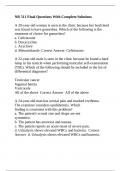-
1. Exam (elaborations) - Nr 511 week 8 final quiz latest/nr 511 week 8 final quiz graded a plus
-
2. Exam (elaborations) - Nr 511 week 6 quiz differential diagnosis and primary care practicum verified 100% a+
-
3. Exam (elaborations) - Nr 511 week 8 reflection assignment graded a verified
-
4. Exam (elaborations) - Exam (elaborations) nr 511 test bank aanp-fnp lightning round complete review 2021
-
5. Exam (elaborations) - Nr 511 midterm question from dunphy book chapters 11, 9, 8, 7 questions with complete...
-
6. Exam (elaborations) - Nr 511 final test preparation (based on primary care: art and science of advanced pra...
-
7. Exam (elaborations) - Nr 511 midterm sanner study questions with complete solutions
-
8. Exam (elaborations) - Sanners review - final nr511 questions with complete solutions
-
9. Exam (elaborations) - Nr 511 / nr511 chamberlain college of nursing -nr 511 week 1 exam questions with comp...
-
10. Exam (elaborations) - Nr 511 / nr511 chamberlain college of nursing -nr511 final questions with complete so...
-
11. Exam (elaborations) - Nr 511 / nr511 chamberlain college of nursing -nr 511 midterm questions with complete...
-
12. Exam (elaborations) - Nr 511 / nr511 chamberlain college of nursing -midterm nr 511 questions with complete...
-
13. Exam (elaborations) - Nr 511 / nr511 chamberlain college of nursing -chamberlain nr 511 final questions wit...
-
14. Exam (elaborations) - Nr 511 / nr511 chamberlain college of nursing -nr511 midterm questions with complete ...
-
15. Exam (elaborations) - Nr 511 / nr511 chamberlain college of nursing -nr 511 midterm sanner study questions ...
-
16. Exam (elaborations) - Nr 511 / nr511 chamberlain college of nursing -nr 511 midterm questions and answers w...
-
17. Exam (elaborations) - Nr 511 /nr 511 chamberlain college of nursing -nr 511 final questions with complete s...
-
18. Exam (elaborations) - Nr 511 / nr511 chamberlain college of nursing -nr511 final exam questions with comple...
-
19. Exam (elaborations) - Nr 511/ nr511 chamberlain college of nursing -nr511-all quiz/exam questions with comp...
-
20. Exam (elaborations) - Nr 511 / nr511 chamberlain college of nursing -nr 511 final
-
21. Exam (elaborations) - Nr 511 / nr511 chamberlain college of nursing -final exam nr 511 questions with compl...
-
22. Exam (elaborations) - Nr 511 / nr511 chamberlain college of nursing -nr511 final
-
23. Exam (elaborations) - Nr 511 midterm questions with complete solutions1.
-
24. Exam (elaborations) - Nr 511 midterm questions with complete solution1
-
25. Exam (elaborations) - Nr511 midterm practice questions with complete solutions
-
26. Exam (elaborations) - Nr511 midterm diff diagnosis questions with complete solutions
-
27. Exam (elaborations) - Nr511 midterm questions and correct answer.
-
28. Exam (elaborations) - Nr511 midterm-heent questions with complete solutions
-
29. Exam (elaborations) - Nr 511 final exam
-
30. Exam (elaborations) - Chamberlain nr 511 week 2 quiz disorders of gi and ent questions with complete soluti...
-
31. Exam (elaborations) - Nr511 midterm questions with complete solution1.
-
32. Exam (elaborations) - Nr 511 midterm question from dunphy book chapters 11, 9, 8, 7 questions with complete...
-
33. Exam (elaborations) - Nr511 final questions with complete solutions
-
34. Exam (elaborations) - Nr 511 midterm questions with complete solution2.
-
35. Exam (elaborations) - Nr511 final questions with complete solution1
-
36. Exam (elaborations) - Nr511 final exam study guide questions with complete solutions
-
37. Exam (elaborations) - Nr 511 / nr511 chamberlain college of nursing -nr 511 midterm questions and answers w...
-
38. Exam (elaborations) - Nr511 midterm questions and answers graded a
-
39. Exam (elaborations) - Chamberlain nr 511 midterm questions with complete solutions
-
40. Exam (elaborations) - Gu male nr 511 questions with complete solutions
-
41. Exam (elaborations) - Nr 511 final exam questions with complete solutions
-
42. Exam (elaborations) - Mid term nr 511 questions with complete solutions
-
43. Exam (elaborations) - Nr511 week 7 questions with complete solutions
-
44. Exam (elaborations) - Nr511 midterm dunphy questions with complete solutions
-
45. Exam (elaborations) - Nr 511 / nr511 chamberlain college of nursing -nr 511 final questions and answers
-
46. Exam (elaborations) - Nr 511 / nr511 chamberlain college of nursing -nr 511 exam questions with complete so...
-
47. Exam (elaborations) - Nr 511 differential diagnosis and primary care- final exam review
-
48. Exam (elaborations) - Nr511 midterm questions with complete solution2
-
49. Exam (elaborations) - Nr 511 np cafe final exam concept review
-
50. Exam (elaborations) - Nr 511 differential diagnosis and primary care- mid term review
-
51. Exam (elaborations) - Nr 511 midterm derm questions with complete solutions
-
52. Exam (elaborations) - Nr511 midterm
-
53. Exam (elaborations) - Nr 511 week 3 eye disorders questions with complete solutions
-
54. Exam (elaborations) - Final nr511 1 questions with complete solutions
-
55. Exam (elaborations) - Nr 511 / nr511 chamberlain college of nursing -nr 511 midterm questions with complet...
-
56. Exam (elaborations) - Nr 511 / nr511 chamberlain college of nursing -nr 511 final questions with complete s...
-
57. Exam (elaborations) - Nr511 exam questions with complete solutions
-
58. Exam (elaborations) - Nr 511 / nr511 chamberlain college of nursing -nr 511 final question to review questi...
-
59. Exam (elaborations) - Nr 511 final anemia & men's health questions with complete solutions
-
60. Exam (elaborations) - Nr511 final exam questions with complete solution1.
-
61. Exam (elaborations) - Hemo nr 511 exam questions with complete solutions
-
62. Exam (elaborations) - End of chapter questions nr 511 wks 1-4 questions with complete solutions
-
Show more




